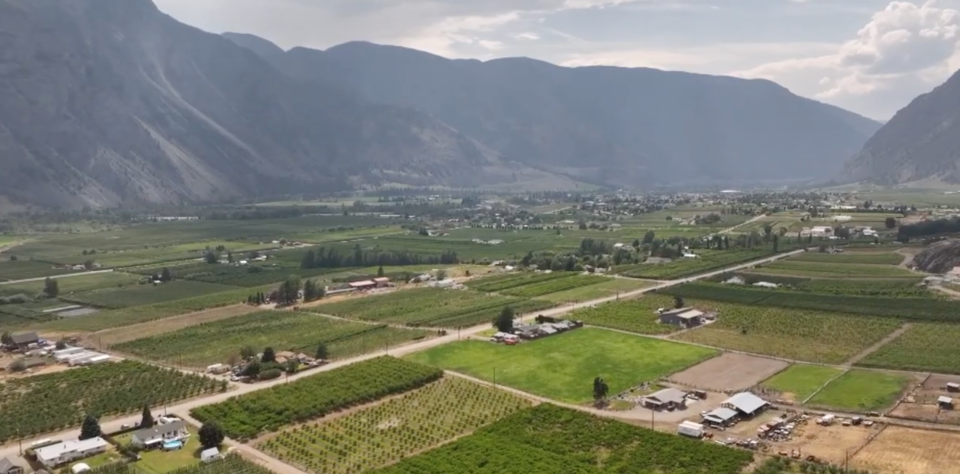“I don't need a government handout. I just need the government to get out.”
Wine Growers BC, along with a couple of Summerland winery owners, are hoping the government will cut the mark-ups on bringing out-of-province grapes in, after a devastating loss from January’s cold snap.
Lightning Rock Winery Owner Ron Kubek said he wants grapes from Washington state to help fill the gap in fruit this year, but nearly 90 per cent markup on the first $11.75 of a wholesale bottle of wine, or per litre, and then the further nearly 30 per cent markup thereafter, is a hard cost to fathom.
“The problem is because of the cost of land and the cost of everything else, the BC wine industry is not sustainable right now the way that it is. So you got a lot of wineries out there that don't have any grapes this year,” he said.
“We've gone down to Washington state. We've looked at other vineyards. The terroir is similar, the soils similar, and the temperature is the same. We looked at buying some grapes from Vancouver Island. The problem was the sugars don't get up good enough for my winemaker to make the great wine that we make.”
Kubek added that importing grapes from Washington is more feasible due to proximity, which ensures freshness and quality.
“While Ontario is an option, the greater distance complicates shipping and can affect quality,” he said, noting that over the next eight years, they’ll have to replant 23 acres of vines.
For 2024, the Liquor and Cannabis Regulation Branch is exempting wineries from producing at least 4,500 litres of their wine on-site each year, for those that experienced crop failure, on a case-by-case basis.
This means that the wineries that have been granted an exemption that if they're unable to produce any wine this year, won't lose their manufacturing licenses and can continue to operate.
Options were also given to anyone holding a Land-Based Winery (LBW) classification, wherein they can contact the BC Liquor Distribution Branch (LDB) to request conversion to a commercial winery classification which would allow them to use out-of-province inputs and grape juice or wine from other commercial wineries.
However, LBW would be subject to the commercial winery sales agreement for the duration of the conversion, which means added costs and markups. And then to convert back to the LBW classification, the winery must meet all the LBW criteria, including depleting all wine made with non-B.C. grapes.
Castanet recently spoke to local winemakers on why these changes weren't enough.
Wine Growers BC Chair Paul Sawler said while there are some disadvantages for land-based wineries moving over to commercial if they had to do it and got relief, it would be far better than not being able to make any wine this year.
“But right now, we're just waiting to hear back from the government on where they are with their proposal. The proposal that we made to them, based on today, would be a net zero for the government,” he said.
“They're not going to make any more, they're not going to cost them anymore. We're not looking for a subsidy. In this case, we're just looking for relaxation of the markup role so we can continue to do business as we're doing it today.”
The society wants to see a temporary suspension of taxes and commercial winery prerequisites for at least three years.
They’re also asking for relief from the excise tax on imported grapes.
Sawler, who is also the Vice President of Sales and Marketing at Dirty Laundry Vineyard, said they have zero wine grapes to harvest this year and expect to replace about 15 to 20 per cent of their vines.
“We're just trying to make sure that we can keep our channels alive until we actually have the grapes to produce again, hopefully in 2025,” Sawler said.
“What we've been looking for from the government is relief from that markup regime that would penalize wineries in British Columbia who have to source their grapes elsewhere for this next year or two to be able to sell that and stay vibrant and healthy.”
Kubek said he wants a decision soon, as it’s less than four weeks away from harvest for some of the grapes that they would be getting from Washington State.
“The government's had months and months to do something on this, and they've done nothing. Pleas have gone unanswered, decisions have gone unanswered,” he added.
“Just make a darn decision and say, ‘Hey, you get the markup exemption for the next two years’ so we can plan so that I can keep my staff employed.”
With numerous wineries having laid the groundwork to be able to pull the trigger on buying grapes south of the border and switching licenses, Sawler said many are just waiting for the government.
“As soon as we understand what the rules are, then we can go about our business and try to make it work,” he said.
“I think the government is just trying to make sure they get it right. The wheels of government don't turn particularly fast. I think they're moving at credible speeds.”
Kubek said he understands that wine is not food nor a necessity, wine is a luxury but for his staff and the people that he buys supplies from, that's their job.
“That's not a luxury. So what I'm asking for the government is to do the right thing that they've talked about doing, but they haven't bothered to do.”
Even with uncertainty ahead for BC winemakers, the Okanagan has plenty of wine for this year's locals and tourists and hopes to see a busy summer.
“We don't want to scare people away from the Okanagan because they think the wineries have no wine. We're working on last year's grapes, and generally the the whole industry has wine to sell and are happy to bring people in,” Sawler said.




